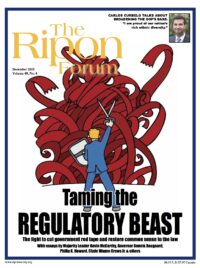
The current administration, frustrated with a Congress that won’t enact progressives’ policies, pushes federal agencies to twist existing laws until they are unrecognizable. This explains many of the Federal Communication Commission’s actions in the last few years, and it has just embarked on its boldest regulatory experiment yet – regulating our modern printing presses – broadband providers and other Internet-based media companies.
Twenty years ago, some farsighted lawmakers saw broadband Internet’s potential to transform communications, technology, and media. Therefore, in 1996 Congress amended the Communications Act to announce that “it is the policy of the United States” that the market for the Internet and Internet access should be “unfettered by Federal or State regulation.” Congress knew the FCC’s history of overreach and did not want the labyrinthine television, radio, and telephone regulations to limit the then-nascent Internet. As a result, the Clinton and Bush administrations shared an (imperfect) express hands-off policy regarding the Internet.
This benign neglect of the Internet encouraged rapid changes in several major industries as video, music, news, gaming, travel, and other services moved online. The Internet Age is one of content abundance and consumer choice. As the economic and social import of the traditional areas of regulation – like cable TV, local telephone, and broadcast radio – diminished in the 1990s and early 2000s, the FCC seemed prepared to accept its role as a more modest, specialized agency focused on paring back the regulatory edifices that it had built up since the 1930s.
The Clinton and Bush administrations shared an (imperfect) express hands-off policy regarding the Internet.
That regulatory philosophy – dubbed “vigilant restraint” by Clinton’s FCC chairman William Kennard – has been abandoned. The Obama administration is determined to reinvent the agency and shape this influential new medium, broadband Internet. According to this newer view, the FCC has all these powerful regulatory tools from earlier eras gathering dust – why not use them? Technological advance has defanged the FCC’s content controls, like the Fairness Doctrine, and industrial policy for broadcast, but the Commission has discovered or voted itself new tools to shape the communications and media industries.
Several initiatives mark the agency’s assertive role in the broadband era. The most notorious and significant attempt at agency reinvention–the 2015 Open Internet Order – came after President Obama implored the nominally independent agency to regulate the Internet. The President was encouraged by media activists who were alarmed, after several setbacks in federal court, that Internet companies might escape pervasive regulatory scrutiny.
The professional advocates and the President demanded “net neutrality,” which is a pliable term designed to obscure their less PR-friendly aims–applying common carriage telephone regulations to Internet providers and technology companies. With these phone regulations, called Title II, the FCC has tried to guarantee its long-term vitality by functioning as a zoning board for the Internet. Under these subjective rules, Internet service providers and tech companies often must seek FCC permission before making changes to Internet-based protocols, technologies, and services. Even routine commercial agreements between Internet-based companies are subject to agency second-guessing and punitive fines. These new regulations plus the agency’s growing abuse of its essentially blank-check authority to approve media and communications mergers mean that the FCC will be instrumental in shaping what voices are heard over the airwaves, online, and on TV.
The Obama administration is determined to reinvent the agency and shape this influential new medium.
The FCC has also redirected billions of dollars of telephone subsidies toward broadband connections, despite the fact that, according to Pew surveys, less than 3% of Americans say affordability is the main reason they don’t use the Internet. These poorly-designed phone subsidy programs have been plagued by waste and fraud from the very beginning. Economists Scott Wallsten and Thomas Hazlett found that, at best, the cost to connect a hold-out household to the telephone network exceeded $100,000. There is every reason to expect waste to continue with the new broadband program since, per Pew, 92% of offline adults, most of whom are over 60, say they simply aren’t interested in subscribing.
The agency is also seeking to unilaterally negate states’ laws in order to fund government-owned broadband networks across the country. This violation of federalism undoes what several states have carefully implemented after finding that city-operated networks frequently turned into taxpayer-funded boondoggles and therefore should be deployed only sparingly. This major priority for the administration is likely to be ruled unconstitutional but it signals a disregard for federalism and for markets.
The late Clay T. Whitehead, a Nixon administration official, once noted that, “The main value of the sword of Damocles is that it hangs, not that it drops.” The FCC has voted itself several hanging swords in order to gain control over the structure and composition of Internet-based economy. Limited government and free speech advocates must sound the alarm as the FCC attempts, based on pretext and flimsy legal rationales, to reinvent itself and regulate the most powerful mass medium yet.
Brent Skorup is an attorney and a research fellow focused on telecommunications and media policy. He is based in Arlington, Virginia.




